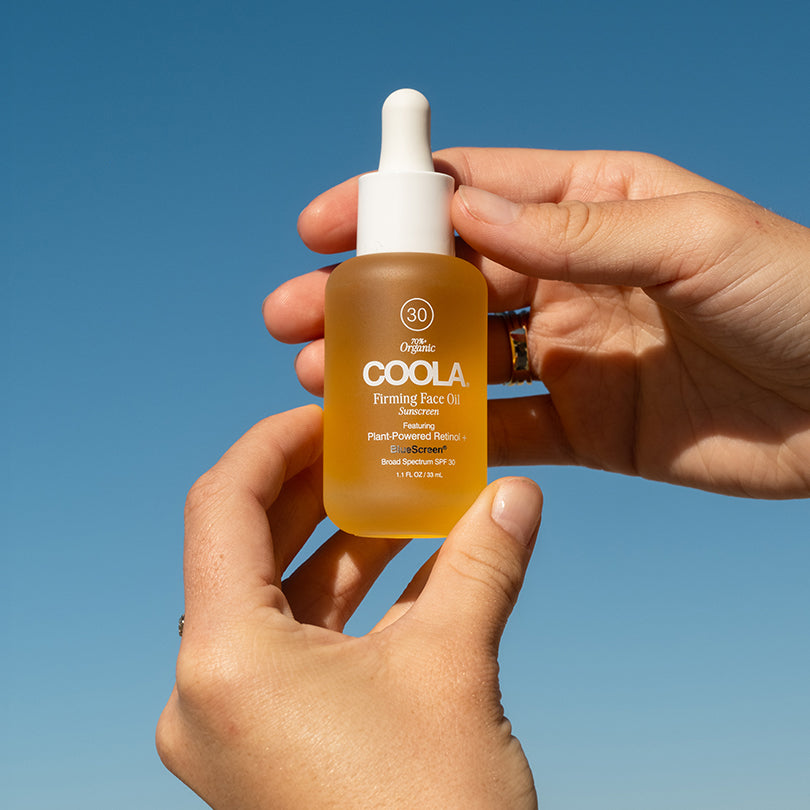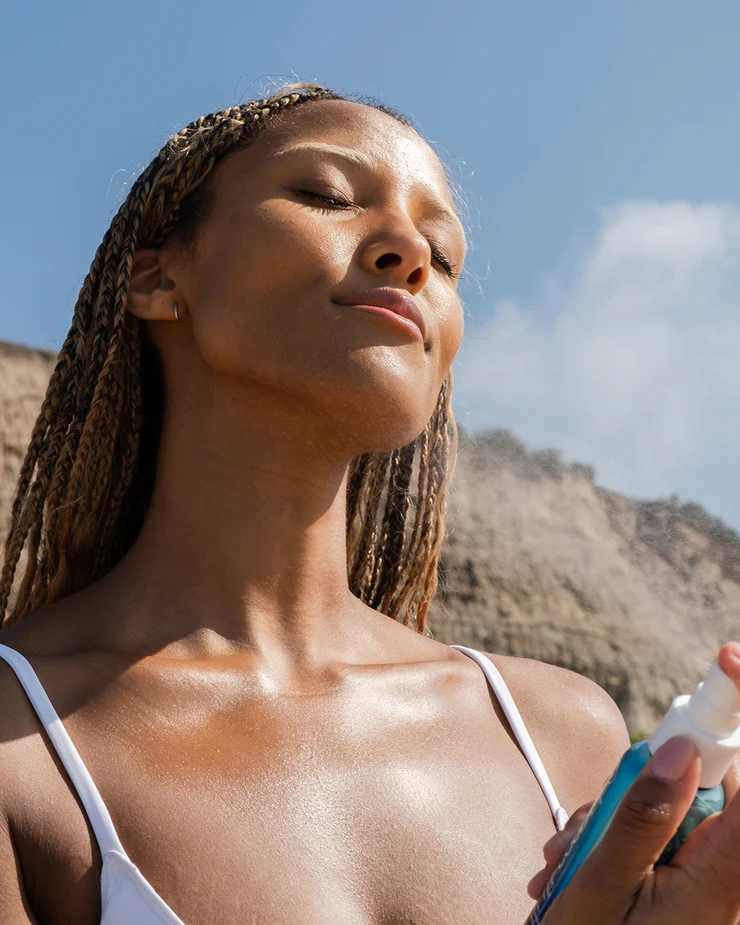If you’re a sunscreen user—and we hope that you are—you’ve probably been hearing about Zinc Oxide over the last few years. It’s not just a buzzword that SPF lovers have been googling recently—it happens to be one of the most common and effective ingredients available in mineral (or physical) sunscreen. But, surprisingly, suncare is not even where this multitasking mineral got its start in the world of skincare.
For several decades before its introduction into sunscreen formulas, Zinc Oxide was the hero ingredient in topical zinc oxide ointment products meant to soothe inflammation—think diaper rash creams and calamine lotions to treat poison ivy. It became a popular SPF option in the ‘80s, when outdoor enthusiasts and lifeguards began using it as a thick layer of extra protection against sun damage (especially on noses), but it’s come a long way since.
If you’ve been wondering “Is Zinc Oxide sunscreen better?”, or even, “Is Zinc Oxide good for skin?”, we will answer these questions and more below. Keep reading to finally get all the details on this mineral ingredient: Is it the superior choice for skin protection? And what are its potential advantages for skin health?
Let’s get into everything Zinc Oxide.
What is Zinc Oxide Sunscreen?
Zinc Oxide is formed when the mineral zinc is oxidized, creating a powder with anti-inflammatory and sun protection properties. It’s a common ingredient in mineral (also known as physical) sunscreens because it acts as a shield from the sun’s rays. It’s different from the filters found in a traditional chemical sunscreens because mineral sunscreen filters sit on the surface of the skin and reflect sunlight, while chemical sunscreen absorbs into the skin.
Because Zinc Oxide sits on top of the skin, it’s typically a very gentle sunscreen filter and a great non-irritating choice for people with sensitive skin. It also works instantly to protect your skin from the sun, because you don’t need to wait for your SPF to absorb, unlike the 15-minute wait time you have with chemical sunscreens.
Today’s mineral sunscreens have come a long way since they rose to popularity with pasty formulas in the ‘80s—non-nano Zinc Oxide is now a lot more user-friendly and less likely to leave that dreaded thick, white cast that physical sunscreens were associated with in the past.
Which is better for sunscreen: Titanium Dioxide or Zinc Oxide?
Titanium Dioxide and Zinc Oxide are both effective mineral sunscreen filters, especially for UVB rays. They’re also the only FDA-approved physical UV filters for sunscreen. So, we must ask: Which is better? And why? Let’s dig into the details.
Zinc Oxide protects against a wider range of UVA rays, making it an excellent sunscreen active as it’s able to cover the full UVA/UVB spectrum on its own. The combination of both mineral actives also provides powerful protection from the sun’s harmful rays.
Titanium Dioxide protects from short-wave UVA and UVB rays and keeps sunscreen formulations lightweight and oil-absorbing. That’s why the combination of the two filters works exceptionally well together in suncare formulas, especially for those with acne-prone skin.
Whether you choose sun protection with one or the other, both ingredients are effective physical sunscreen actives and aren’t ingredients you need to avoid when shopping for your next SPF.

Why Dermatologists Recommend Zinc Oxide Sunscreens
We’ve covered Zinc Oxide and its sun-protection benefits, but that’s not the only reason your dermatologist may recommend products with this hero ingredient. This mineral really is a multitasker that can work wonders on your skin, far beyond sun protection against harmful UV rays.
Let’s cover the reasons why your dermatologist may suggest adding a Zinc Oxide sunscreen to your skincare routine.
Is Zinc Oxide Good for Skin?
We started this write-up with this simple question: Is Zinc Oxide good for skin? And here’s the no-fuss answer: Yes, absolutely. And for most skin types! In fact, when used properly, Zinc Oxide doesn't irritate or aggravate skin, even for those with sensitive or acne-prone skin. Even better for those with acne-prone skin, it doesn’t even clog pores. Don’t worry—we won’t stop there. Let’s talk details. Here's why Zinc Oxide is great for your skin and how you should use it.
The Advantages of Zinc Oxide Sunscreen
Now that we know that Zinc Oxide is good for your skin, let’s talk about why people love this versatile mineral so much: It’s a natural when it comes to sun protection.
Zinc Oxide offers broad-spectrum sun protection. As we mentioned earlier, the mineral works by reflecting both UVA and UVB rays, helping to shield your skin from the sun. This makes it an excellent ingredient for sunscreen, which is why you’ll find this mighty mineral as a protective filter in physical sunscreens.
Using sunscreen daily is essential for healthy skin, and Zinc Oxide is a great filter against harmful UV rays and the damage they can cause—including premature aging and increased risk of skin cancer. Zinc Oxide sunscreens are a great option for both everyday use and more active outdoor activities and can safely be used by most people.
It helps your skin heal
Along with its UV-protection powers, Zinc Oxide is also known for its soothing properties. Gentle on even the most sensitive skin types, it helps promote the healing of skin conditions from sunburns to diaper rash.
You’ll find that topical Zinc Oxide is often used to treat dermatological conditions and even may be used in wound care. Application of Zinc Oxide may reduce redness and irritation, improve healing rates, and can even have anti-bacterial properties.
It’s great for acne-prone and oily skin
Because Zinc Oxide calms inflammation so well, it works especially well on acne-prone skin. In addition to its anti-inflammatory properties, it can also act as an astringent for oily skin, preventing excess oil production. This can help balance the skin’s oil as it calms inflammation—potentially decreasing the risk of additional breakouts.
If you have oily or acne-prone skin, using a Zinc Oxide sunscreen can not only help protect your skin from the sun but also help to calm any existing breakouts and irritation.
Who Should Use Zinc Oxide?
The short answer? Nearly everyone.
Because of its anti-inflammatory properties and gentleness on even sensitive skin, even those with a skin conditions like eczema or rosacea can benefit from using Zinc Oxide skin care products. And as we’ve mentioned, using a gentle, calming daily sunscreen that touts this mineral as its star ingredient is an excellent idea to prevent skin irritation for those with acne-prone skin.
Many people who are acne-prone shy away from using an SPF, worrying that it may induce a breakout. But this doesn’t have to be the case. Using a calming SPF packed with Zinc Oxide, like our Clear Skin Oil-Free Moisturizer SPF, is not only essential to protect skin from the sun but is also gentle and calming to acne-prone skin’s inflammation. Especially if there are other products with active skincare ingredients being used to treat acne.
A Zinc Oxide sunscreen is also a perfect choice for people who have hyperpigmentation because physical sunscreens don’t allow UV light to enter the skin, in turn, avoiding further pigmentation issues or redness.
The Disadvantages of Zinc Oxide Sunscreen
Now that we’ve laid out the extensive benefits of Zinc Oxide, let’s discuss the potential disadvantages of using this mineral on your skin.
Who Shouldn't Use Zinc Oxide?
We’ve detailed how Zinc Oxide is gentle and great on nearly all skin types, but who should avoid using this mineral wonder?
In most cases, Zinc Oxide is non-allergenic, anti-inflammatory, and even non-comedogenic—so, safe to use for most people. But, that doesn’t mean it’s not possible to be an allergen to some. If allergic, Zinc Oxide could cause reactions including itching, swelling, and rashes. If you are prone to allergies, make sure that you consult your doctor before incorporating Zinc Oxide products into your routine. This goes for using it on your kids or babies, too.
Additionally, if you have a deeper skin tone you may find that some mineral sunscreen formulas that contain Zinc Oxide leave a gray or white cast on your skin. Using a tinted version of this mineral sunscreen can help banish the cast. You can also try newer formulations, which may blend into the skin better than formulas of the past. Whether you’re trying to learn how to remove mineral sunscreen from your skin or how to get sunscreen out of your eyes safely and effectively when you accidentally get sunscreen in your eyes, our expert guide has all the information you need.
COOLA's Commitment to Healthy and Safe Sun Protection
Mineral sunscreen—like the COOLA mineral sunscreen collection—is extra gentle on skin, making these skincare products great for babies, kids, or anyone with sensitive skin types. We’ve formulated lightweight mineral options, including mineral lotions and sprays that feature genre-defying technology that allows our formulas to rub in sheer, all while delivering powerful broad-spectrum protection.
No matter what sunscreen works best for your lifestyle, you’ll find a COOLA organic, healthy, luxurious-feeling skincare product you love to wear—every day.



